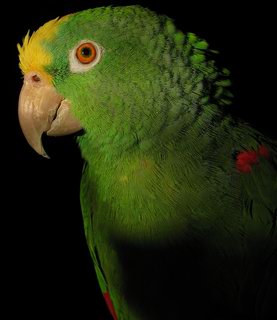|
| Query: amazon parrot | Result: 9th of 227 | |
Yellow-crowned Amazon (Amazona ochrocephala) - Wiki
| Subject: | Yellow-crowned Amazon (Amazona ochrocephala) - Wiki
| |

| Resolution: 277x320
File Size: 19794 Bytes
Date: 2003:07:14 19:43:48
Camera: Canon PowerShot G3 (Canon)
F number: f/4.0
Exposure: 1/250 sec
Focal Length: 922/32
Upload Date: 2007:09:05 10:50:48
|
Yellow-crowned Amazon
From Wikipedia, the free encyclopedia
[Photo] Yellow-crowned Amazon (Amazona ochrocephala). yellow naped amazonian parrot. Date: 14 July 2003. Photo by http://en.wikipedia.org/wiki/User:Brandon.irwin
The Yellow-crowned Amazon or Yellow-crowned Parrot (Amazona ochrocephala), is a species of parrot, native to the Americas with subspecies occurring from Mexico south to Peru and Brazil. There are feral populations of the subspecies oratrix in southern California, Florida and Puerto Rico. It is also known as the Yellow-headed Amazon, Yellow-headed Parrot, Yellow-naped Amazon, Yellow-naped Parrot or Panama Amazon.
Description
It is 35 to 37 cm long. The plumage is primarily green, with a yellow face and crown, a pale bill, white eye-ring and a red flash on the shoulder at the bend of the wing. Adult males and females do not differ in plumage; juveniles have the yellow colour restricted to the fore-crown and lack the red at the bend of the wing.
Habitat
It is a bird of tropical deciduous woodland, thorn scrubs, pine forest, mangroves, pine savanna and may also be found on cultivated land and in urban areas. It is strictly a lowland bird.
Behaviour
They are normally found in pairs, rather than flocks. Their food includes fruits, nuts, and seeds and berries. The nest is usually in tree cavities where they lay three or four eggs. The incubation time varies from 25 to 26 days. Chicks stay in the nest from 21 to 70 days.
Subspecies
There are ten subspecies listed by the IUCN, but definitive classification has proved difficult, as the subspecies are more closely related than is the case with other Amazon parrot species and there has been little research into the genetic diversity of the different subspecies. Authorities at times divide them into three distinct species: A. ochrocephala, the Yellow-crowned Amazon, A. auropalliata, the Yellow-naped Amazon, and A. oratrix, the Yellow-headed or Double Yellow-headed Amazon. Classification is acknowledged as a "taxonomic headache" (Howell and Webb 1994), and the IUCN not only lists the Yellow-naped and Yellow-headed Amazons as subspecies of the Yellow-crowned, but also lists them as separate species. This three-way split, though widely used, has not so far been supported by research. The ten subspecies are:
Amazona ochrocephala tresmariae: Tres Mar??as Islands, off west-central Mexico
Amazona ochrocephala oratrix: Pacific and Atlantic lowlands of Mexico
Amazona ochrocephala belizensis: Belize
Amazona ochrocephala caribea: Bay Island, Honduras
Amazona ochrocephala parvipes: north-east Honduras and north Nicaragua
Amazona ochrocephala panamensis: western Panama to north-west Colombia;
Amazona ochrocephala ochrocephala: eastern Colombia, Venezuela, Trinidad (Trinidad and Tobago), Guyana, Suriname and French Guiana down to Par??, Brazil
Amazona ochrocephala xantholaema: Marajo Island, in the Amazon delta of northern Brazil;
Amazona ochrocephala nattereri: southern Colombia, eastern Ecuador, eastern Peru, northern Bolivia and western Brazil.
Amazona ochrocephala auropalliata: southern Mexico to north-western Costa Rica
Other subspecies sometimes mentioned in the literature are Amazona ochrocephala hondurensis which occurs in Honduras, and is normally included with either of the subspecies occurring in Honduras, Amazona ochrocephala guatemalensis, native to Guatemala, which is included with A. o. belizensis, and Amazona ochrocephala magna, occurring on the Caribbean coast of Mexico, which is generally not considered valid.
Conservation
The species is rated as Least Concern by the IUCN. Although populations are believed to be in decline they do not yet approach the threshold specified by the IUCN to rate the species as Near Threatened, although two subspecies (A. o. oratrix and A. o. belizensis) are recognized by the IUCN to be threatened by loss of habitat and trapping for the pet trade, and six subspecies (A. o. oratrix, A. o. belizensis, A. o. auropalliata, A. o. caribaea, A. o. parvipes, and A. o. tresmariae) are listed in Appendix I of CITES banning trade in the birds. In some areas of its range the bird is extremely common, and with doubt over the divisions between subspecies it is difficult to effectively gather data of the relative health of individual subspecies populations.
http://en.wikipedia.org/wiki/Yellow-crowned_Amazon
| The text in this page is based on the copyrighted Wikipedia article shown in above URL. It is used under the GNU Free Documentation License. You may redistribute it, verbatim or modified, providing that you comply with the terms of the GFDL. |
|
Comments |
|---|
| | Guest |
|
Scientific Name: Amazona ochrocephala (Gmelin, 1788)
Common Names: Yellow-crowned Amazon, Yellow-crowned Parrot
French: Amazone à front jaune; German: Gelbscheitelamazone; Spanish: Amazona real
Taxonomy: Psittacus ochrocephalus J. F. Gmelin, 1788, Venezuela. |
^o^
Animal Pictures Archive for smart phones
^o^
|
|
|

